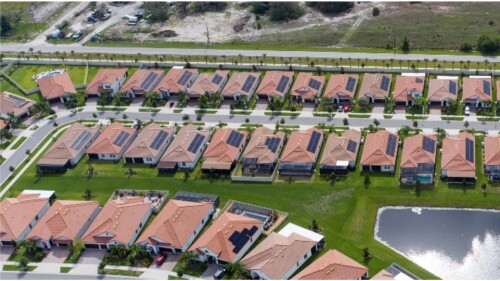Despite a jumpy stock market and shaky global conditions, the U.S. economy appears to be on solid ground for the near future, according to the latest ULI Real Estate Consensus Forecast. During panel discussion at the ULI Fall Meeting, three of the real estate industry’s leading economic experts explained their reasons for optimism while adding notes of caution.
“I’m relatively optimistic,” said Ben Breslau, managing director of Americas research at JLL.
The new report, produced by the ULI Center for Capital Markets and Real Estate, which reflects input compiled from 48 leading real estate analysts from 36 organizations, predicts key economic indicators will continue to rise over the next three years while unemployment drops to 4.8 percent by 2017. Real estate prices should also continue to rise, “but, starting in 2016, at more subdued rates than the past five years,” the report finds.
In the short term, the economy might perform better than the forecasts, Kevin Thorpe, head of research at Cushman & Wakefield, suggested during the panel discussion. Cold weather in the east might have dampened recent economic performance, which should eventually receive a boost from low gasoline prices, he said.
“I would argue on the side of [the forecast] underestimating growth,” Thorpe said. Though the stock market has been on a roller coaster, it does not necessarily reflect the overall economy. “So far, it looks like this correction is contained to the stock market,” Thorpe said.
Although growth is slowing, all the commercial real estate sectors will post double-digit returns in 2015, the analysts polled for the “Consensus Forecast” said. The industrial sector is expected to report returns of 13.0 percent, with retail closer to 12.2 percent and office at 11.6 percent.
“We see tenants in office expanding,” Breslau said, during the panel discussion. “We’re pretty bullish on office.”
But there are still data to watch that will provide tell-tale signs of the overall health of the economy going forward, including a potential interest rate hike, the panelists said. “We’re all waiting for wage growth to kick in,” said Kenneth Rosen, chairman of the Rosen Consulting Group.
In the short term, turmoil in the public markets may continue to affect real estate, but private investors should continue to find real estate returns appealing, Rosen said. “People are searching for yields,” he said. “Four percent looks great.”
Many large issues loom, which could stall the economy, the economists agreed. Debt levels remain high, and the potential for rising defaults is a major concern, Rosen said. “The second risk is political,” Rosen said, citing the uncertainty about how the next president will handle economic issues.
China is another great unknown. The U.S. stock market’s roller-coaster performance this summer was partially attributable to the plunge in China’s stock market. A more severe slowdown in that country’s economy would send ripples through many industries.
Meanwhile, Brazil, Greece, and Russia continue to foster disorder and doubt. But the real estate economists on the panel were skeptical that the global issues would cause deep issues for the United States.
“Historically there doesn’t seem to be connection between global turmoil and the U.S. economy,” Thorpe said. “My fear is on the monetary policy side.”
The Federal Reserve will almost certainly raise rates in the near future, although analysts cannot agree on when. The public markets remain very nervous about rising interest rates, Rosen said.
Oil prices will be another key variable. While sharply lower oil prices will eventually find their way to consumers, in the short term the glut of oil is going to badly damage the health of many large energy companies. The panel named Houston as one real estate market likely to be affected.
“Houston is no place for a long-term investor,” Rosen said. Added Breslau, “We’ve seen a big jump in availability in Houston.” But if oil prices remain low, “I think it is a net positive for growth” in the overall economy, Rosen said.
The industrial sector should benefit from a variety of factors, including a major shift toward smaller distribution centers as e-commerce continues to grow, panelists said. A boost in housing construction could increase the need for warehouse space for materials, Thorpe said. “The missing piece for industrial is housing,” he said.
Rosen remains bullish on apartments, even though he thinks certain areas may be overbuilt due to increasing demand. The retail sector faces headwinds due to the continued growth of e-commerce, he said.
The “Consensus Forecast” predicts that total returns in the office sector will decline from 11.6 percent in 2015 to 8.2 percent in 2017. A downturn in technology companies could hurt office markets like San Francisco, and “the trend toward creative office space is here to stay,” Breslau said. “We will see some spiking of rents,” Breslau said.
Although the panelists generally shared an optimistic view of the new few years, they also agreed both the economy and real estate are on the tail end of the current upward cycle. While it might not happen next year, all the panelists agreed that the bullish cycle is going to end in the next few years. Breslau said there is a high probability of a recession or a major correction after 2017.
“I think [the current cycle] will last longer, but in the end there will be a correction,” Rosen




